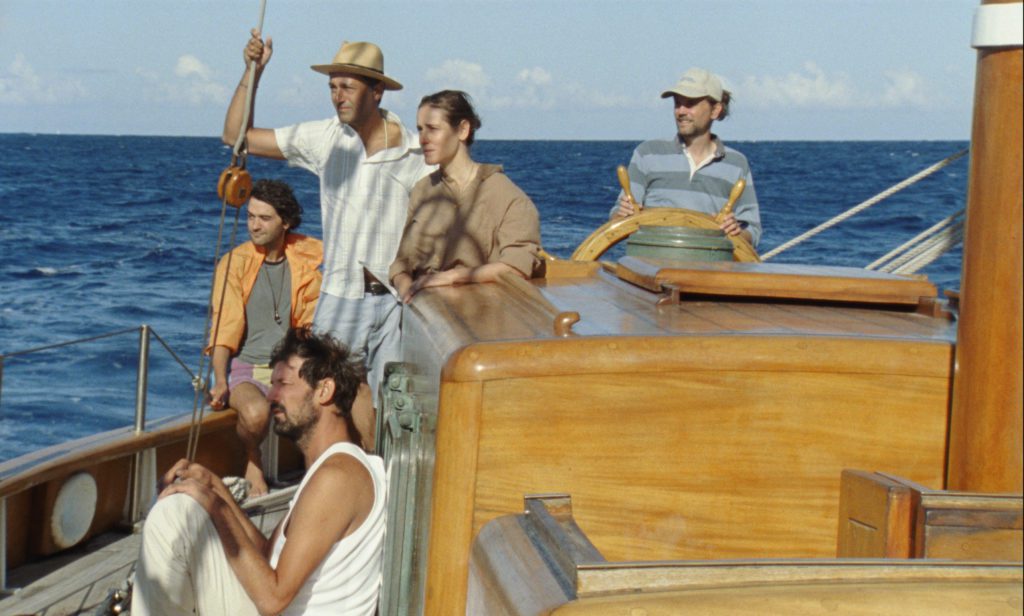
Helena Wittmann’s Human Flowers of Flesh is a seaswept reverie rendered in a thousand shades of blue. Set in the waters and coastal towns of the Mediterranean, the movie wanders and wonders, forming an inquisitive, sensorial film poem. Wittmann constructs a shallow, open-lidded narrative container: Ida (Angeliki Papoulia) lives on a sailing yacht, along with her small crew. Seeking something perhaps even she does not fully understand, she develops a fascination with the French Foreign Legion, an interest that guides her on an ambiguous journey. The story is more an inflection point than a foundation, allowing plenty of room for the film to meander freely. It does so very slowly, something Wittmann is clearly conscious of; there are, after all, two cameos from a stowaway snail. This patience gives the film a spontaneity and lightness. We follow the pull of Wittmann’s curiosity, lingering on quiet details that showcase her dazzling powers of observation. The dearth of dialogue tunes our ears to a whole new world of sounds: a loogie hitting the water; a swimmer breaking the waves’ surface; ropes straining and wood creaking. Wittmann’s camera has a keen eye for texture, light, and motion. It records the sun filtering into the boat’s cabin; the horizon line bobbing in and out view through a porthole; and the brilliance of the sea-blue that colors the restless waters.
The Foreign Legion, however, proves more difficult to capture. The elite military organization used to enforce France’s colonial project is a kind of heterotopia, connected to broader society yet incontrovertibly different and separate. This separation may be what draws both Ida and Wittmann to the Legion, and Wittmann embraces the challenge of visualizing what is today a largely invisible construct. We catch glimpses of legionnaire life from the perimeters of their camps, as well as through old photographs and anecdotes from different characters. Wittmann also draws an analogy between the legionnaires and Ida’s crew. The crew embodies the Legion’s utopian elements: an international, multi-ethnic, self-sufficient group that lives in harmonious cooperation. Yet the amity and friendship among the crew have little in common with the animosity and distrust that characterize the Foreign Legion in Claire Denis’ Beau Travail (1999).
It’s impossible to ignore Beau Travail’s influence on Human Flowers of Flesh, and Wittmann acknowledges Denis’ film in ways both explicit and subtle. They share a similar interest in interrogating the aesthetics of colonial military institutions, and their approaches to filming bodies have clear parallels. But the film’s debt to Beau Travail should not be overstated, as Wittmann’s style and mode of inquiry are very much her own. Human Flowers of Flesh is imbued with a soft magic realism distinct from Beau Travail’s tension and rigor. In an early scene, one of the crew recounts the mythology of coral, how they came into being from Medusa’s head. This opens the door for uncovering the magic beneath everything that follows, beyond the pure beauty of Wittmann’s images. In the last sequence, something teased in the opening credits finally occurs: the appearance of Denis Lavant, star of Beau Travail. Rather than a realistic epilogue for Lavant’s character Galoup, his presence seems summoned by Ida’s imagination as she comes face to face with the mystery that has so fixated her.
Human Flowers of Flesh is a highly rhythmic film. The editing by Wittmann and sound design by Nika Son build a hypnotic cadence, accentuated by the boat’s gentle, persistent rocking. Mal de débarquement is a phenomenon that can manifest after an extended period at sea. Once ashore, the afflicted continue to feel the motion of boats, waves, and currents. Despite the term’s negative connotation, the sensation can be thrilling, as if you’re inhabiting two places at once because of the sea’s miraculous power. If not literally, Human Flowers of Flesh exerts an analogous influence psychologically and emotionally; it has a strange, magnetic quality that endures long beyond its duration.
Human Flowers of Flesh
2022
dir. Helena Wittmann
106 min.
Part of the 60th New York Film Festival – click here to follow the Hassle’s continuing coverage!

